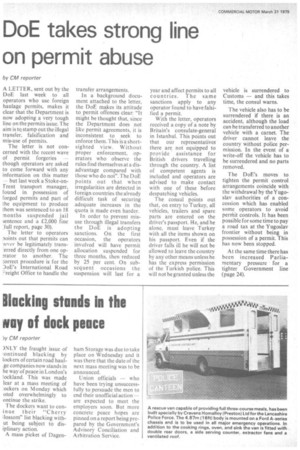DoE takes strong line on permit abuse
Page 22

If you've noticed an error in this article please click here to report it so we can fix it.
by CM reporter A LETTER, sent out by the DoE last week to all operators who use foreign haulage permits, makes it clear that the Department is now adopting a very tough line on the permits issue. The aim is tq stamp out the illegal transfer, falsification and mis-use of permits.
The letter is not concerned with the recent wave of permit forgeries — though operators are asked to come forward with any information on this matter — but last week a Stoke-onTrent transport manager, found in possession of forged permits and part of the equipment to produce them was sentenced to an 18 months suspended jail -ientence and a £2,000 fine "full report, page 30).
The letter to operators points out that permits can ;ever be legitimately trans-erred directly from one op;rator to another. The :..orrect procedure is for the DoE's International Road :7reight Office to handle the transfer arrangements.
In a background document attached to the letter, the DoE makes its attitude to permit offences clear: "It might be thought that, since the Department does not like permit agreements, it is inconsistent to seek to enforce them. This is a shortsighted view. Without proper enforcement, operators who observe the rules find themselves at a disadvantage compared with those who do not". The DoE points out that when irregularities are detected in foreign countries the already difficult task of securing adequate increases in the quota is made even harder.
In order to prevent misuse through illegal transfers the DoE is adopting sanctions. On the first occasion, the operators involved will have permit allocation suspended for three months, then reduced by 25 per cent. On subsequent occasions the suspension will last for a year and affect permits to all countries. The same sanctions apply to any operator found to have falsified a permit.
With the letter, operators received a copy of a note by Britain's consulate-general in Istanbul. This points out that our representatives there are not equipped to provide assistance for British drivers travelling through the country. A list of competent agents is included and operators are advised to make contact with one of these before despatching vehicles.
The consul points out that, on entry to Turkey, all vehicles, trailers and spare parts are entered on the driver's passport. He, and he alone, must leave Turkey with all the items shown on his passport. Even if the driver falls ill he will not be allowed to leave the country by any other means unless he has the express permission of the Turkish police. This will not be granted unless the vehicle is surrendered to Customs — and this takes time, the consul warns.
The vehicle also has to be surrendered if there is an accident, although the load can be transferred to another vehicle with a carnet. The driver cannot leave the country without police permission. In the event of a write-off the vehicle has to be surrendered and no parts removed.
The DoE's moves to tighten the permit control arrangements coincide with the withdrawal by the Yugoslav authorities of a concession which has enabled some operators to avoid perrnit controls. It has been possible for some time to pay a road tax at the Yugoslav frontier without being in possession of a permit. This has now been stopped.
At the same time there has been increased Parliamentary pressure for a tighter Government line (page 24).








































































































































